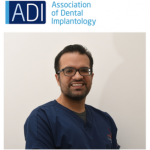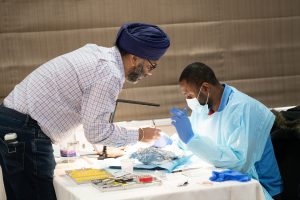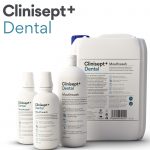Former CDO, Barry Cockroft, shares his thoughts on the pandemic and its effects on dentistry.
I think one of the things people now agree on is that we are going to have to learn to live with Covid-19. It is not going away.
There are different ways of classifying viruses but one of the simplest is to just divide them into those that mutate and those that don’t. I am not an expert in virology, but I am old enough to remember that smallpox and polio were both viral diseases that killed many people every year when I was a small child and led to entire towns being placed in quarantine. What has completely changed that is that neither of these diseases are caused by a virus that mutates and that enabled scientists to develop vaccines which have, since I was a child, eradicated these diseases – smallpox completely and polio almost completely. Viruses need a host to survive and spread so widespread vaccination has deprived these viruses of the ability to cause disease nowadays.
History is one our most important learning tools, and we only have to look back just over a hundred years to get a good idea of where Covid-19 is potentially going.
Just after the First World War, an outbreak of Spanish flu killed around fifty million people worldwide and around a quarter of a million in the UK. These figures are likely to be underestimates as data gathering was not as sophisticated and worldwide as it is now. One positive though that has come out of this current pandemic is that people have come to realise that without data we are “flying blind” in dealing with this sort of situation. Data is vital in tackling disease and, in dentistry, we are lucky to be so “data rich”.
The influenza virus is similar to that which causes Covid and is constantly changing and mutating and will continue to do so. Influenza causes respiratory symptoms and, like Covid, is most dangerous (though not exclusively) for those who are already not in the best of health, particularly older people. This country has had a widespread flu vaccination programme for years now, which both reduces the number of cases and the severity of disease experienced in those who are infected. Despite this programme, thousands of people die every year from influenza or complications arising from it. This is likely where we are going in the future with Covid; the virus will keep mutating and scientists will continue developing new vaccines in response. It is like a game of chase with scientists trying to work ever quicker to catch up with the latest variants and, as with flu, trying to guess (informed guesswork) what will be the next variant to affect the country. The flu virus changes every year, and the gathering of data worldwide helps the scientific community work as efficiently as possible. Throughout the pandemic, the science and data gathered around the free world has been similar but paced differently depending on the measures imposed. Political responses have varied but have largely been based on similar principles: isolate and lockdown until a vaccine has been developed and then vaccinate as widely and quickly as possible, starting with the most vulnerable. It has been easy to lose focus on the disease and point to sixty-mile round trips in the North East of England to “test your eyesight” or comment on “partygate” (as important as these incidents are) but the fact is that whatever measures are imposed and how successful the vaccination programme is we have to learn to live with this disease, it has now become endemic. This does not mean it has gone away or the disease is automatically less serious when it does occur but rather that the combination of widespread natural immunity and vaccination means that it is now better to get back to normality as quickly as possible without being complacent.
Dentistry has been through some particularly tough times over the last couple of years, sometimes quite appropriately and sometimes questionably so. A backlog of unmet demand and need has built up and dentists need to be supported to tackle that or oral health will be more permanently damaged.
Politics (with a small or large p) can do enormous damage. I well remember the campaign to undermine HTM 01 05 when it was published, not based on evidence, as there was little new in the document, but based on the policy in the profession at the time to oppose everything government proposed. We have seen that during this pandemic as people conflate poor personal choices made at the top level with scientifically supported policy.
Dentists have been used to providing services to a high standard and, with a high standard of cross infection control, perhaps now is the time to go back to that basic evidence-based standard and make sure, by monitoring the disease incidence data, that this is not increasing the risk?



















